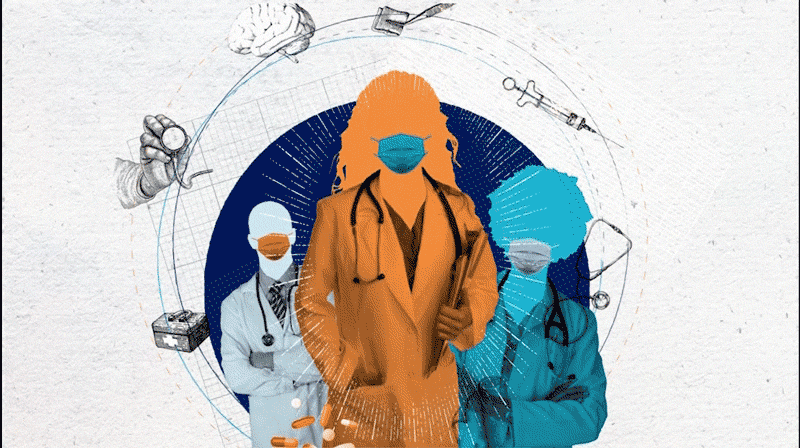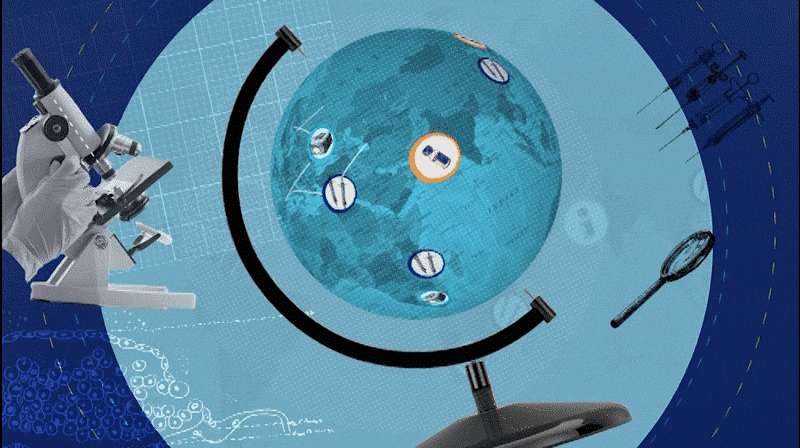| | | | | | | Presented By PhRMA | | | | Vitals | | By Caitlin Owens ·Nov 02, 2020 | | Good morning. I hope you all found safe ways to celebrate Halloween this weekend. I walked Piper around in her unicorn costume and she loved it. Today's word count is 1,089 or a 4-minute read. | | | | | | 1 big thing: Health industry has evaded major changes under Trump |  | | | Illustration: Aïda Amer/Axios | | | | President Trump vowed to overhaul the health care system, notably saying in one of his first post-election speeches that pharmaceutical companies were "getting away with murder" over their pricing tactics. Yes, but: Four years later, not a lot has changed. If anything, the health care industry has become more financially and politically powerful, Axios' Bob Herman reports. "Most of the bigger ideas have either been stopped in the courts or just never got implemented," said Cynthia Cox, a vice president at the Kaiser Family Foundation who follows the health care industry. - The administration killed its own regulation that would have changed behind-the-scenes negotiations between drug companies and pharmacy benefit managers.
- One of the most consequential drug proposals — tying Medicare drug prices to lower prices negotiated abroad — is not remotely close to going into effect.
- Forcing drug companies to disclose prices in TV ads was a small gambit, and the courts ultimately struck down the idea.
The other side: The policies the administration has seen through, so far, have been relatively modest. Between the lines: Health care has consistently raked in large sums of profit every year of Trump's presidency. That has been especially true during the pandemic. |     | | | | | | 2. Europe heads back into lockdown |  | | | A worker packs away awnings outside a cafe in London. Photo: Hollie Adams/Getty Images | | | | A slew of European countries have announced new lockdowns over the last week in response to uncontrolled spread of the coronavirus. Between the lines: Many of these countries are facing the threat of overrun health care systems in the near-term future and, potentially, harrowing decisions about how to ration care, the Washington Post reports. - "An exponential phenomenon starts with very small numbers, and it is not tangible for weeks and weeks and weeks for people out there," Emmanuel André, a leading Belgian virologist, told the Post. "If you look at the numbers, you have very strong indicators early on that things are going wrong, but it is only at the very end that things explode."
What we're watching: The U.S. is on a similarly dire trajectory, although it's unclear how we'll respond. Driving the news: A new national lockdown will be imposed in England, Prime Minister Boris Johnson announced Saturday, as the number of COVID-19 cases in the country topped 1 million. - Austria announced a four-week nighttime curfew and the closure of cafes, bars and restaurants as another surge of coronavirus infections strains the country's health care system, according to Reuters.
- Greek Prime Minister Kyriakos Mitsotakis said over the weekend that most of the country will resume a coronavirus lockdown starting Tuesday, including closing restaurants, bars, cafes, movie theaters and gyms, AP reports.
- Belgium began enforcing a strict lockdown yesterday amid rising coronavirus infections, hospital admissions and a surge of deaths.
|     | | | | | | 3. The virus is becoming impossible to track | | Americans increasingly have no idea where they're catching the virus, and contact tracing efforts are falling apart in the face of the sheer number of cases, NYT reports. Why it matters: It's much easier to close down a meatpacking plant — or even contain an outbreak in a nursing home — than to contain a virus spreading rapidly through the population from an unknown number of origins. Between the lines: The number of cases is several times above what experts say is realistic for contact tracing, and health officials in some places have given up on tracking the virus. - Earlier on in the pandemic, uncontrolled spread was limited to a few major cities or specific regions, but it's now happening across the country.
The big picture: "The problem, of course, is that failing to fully track the virus makes it much harder to get a sense of where the virus is flourishing, and how to get ahead of new outbreaks," NYT writes. - "But once an area spins out of control, trying to trace back each chain of transmission can feel like scooping cupfuls of water from a flood."
The bottom line: The U.S. has attempted to use a strategy of testing, tracing and isolation to keep the pandemic in check. But the virus is very much out of control, and this strategy is falling apart. That leaves a serious question of where we go from here. |     | | | | | | A message from PhRMA | | The key to developing more – and more affordable – medicines | | |  | | | | One reason so many COVID-19 vaccine candidates are in late stage clinical trials is because companies are able to share information around vaccine technology. Our IP system – including patents – provide scientists with information that leads to more options for all kinds of treatments. | | | | | | 4. At-home rapid COVID test to move forward | | Two companies behind an at-home rapid COVID-19 test are releasing encouraging clinical trial results ahead of applying for an emergency use authorization (EUA), company executives tell Axios' Bryan Walsh. Why it matters: Antigen tests that could quickly provide results at home would be a major help in identifying and slowing the spread of COVID-19, but they have to get into the hands of consumers at an affordable price. Driving the news: Cellex, a biotechnology company, and Gauss, a computer vision startup, announced this weekend that their rapid at-home coronavirus test achieved sensitivity rates of 94% and specificity rates of 97% compared to the PCR gold standard of lab tests, in a recent clinical trial. - Sensitivity refers to a test's ability to identify true positive cases, while specificity refers to its ability to find true negatives.
- Those results are encouraging enough for the companies to move forward for an application for an EUA from the FDA, which is needed to fast track the test for home use.
The big picture: Cellex and Gauss are among dozens of companies racing to produce and market rapid at-home tests, but according to the Washington Post this week, no firm has yet applied to the FDA for authorization. - One concern about at-home tests is that the results may not flow to officials, leaving them in the dark on COVID-19 spread, though Cellex and Gauss have partnered with a data integration platform to transmit test results.
|     | | | | | | 5. Catch up quick |  | | | Illustration: Aïda Amer/Axios | | | | 18 Trump campaign rallies "ultimately resulted" in more than 30,000 incremental confirmed COVID-19 cases and "likely led to more than 700 deaths," researchers at Stanford University concluded in a study published Friday. 18 states set new highs last week for coronavirus infections recorded in a single day, according to the COVID Tracking Project and state health departments. Nine states surpassed records from the previous week, Axios' Orion Rummler reports. NIAID director Anthony Fauci praised the Biden campaign's coronavirus stance, criticized White House adviser Scott Atlas and offered a bleak assessment of the U.S. pandemic response in an interview with the Washington Post, published Saturday. Atlas apologized on Twitter for appearing Saturday on Russia's state-controlled RT network, where he insisted that the U.S. is turning the corner on the pandemic and that lockdowns are actually "killing people." Former FDA commissioner Scott Gottlieb, who served under President Trump, said on "Face the Nation" Sunday that his "view is the inflection point will be Thanksgiving" on the coronavirus as the virus has surged throughout the country. |     | | | | | | A message from PhRMA | | The key to developing more – and more affordable – medicines | | |  | | | | One reason so many COVID-19 vaccine candidates are in late stage clinical trials is because companies are able to share information around vaccine technology. Our IP system – including patents – provide scientists with information that leads to more options for all kinds of treatments. | | | | | | Axios thanks our partners for supporting our newsletters.
Sponsorship has no influence on editorial content. Axios, 3100 Clarendon Blvd, Suite 1300, Arlington VA 22201 | | | You received this email because you signed up for newsletters from Axios.
Change your preferences or unsubscribe here. | | | Was this email forwarded to you?
Sign up now to get Axios in your inbox. | | | | Follow Axios on social media:    | | | | | |
Post a Comment
0Comments